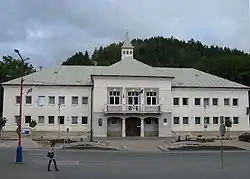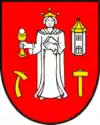Krompachy
Krompachy (German: Krombach, Hungarian: Korompa) is a town in Slovakia, with a rich mining and metallurgical history, well-known both in Slovakia and in its close neighboring countries for its Plejsy ski center.
Krompachy
German: Krompach | |
|---|---|
Town | |
 Krompachy City hall | |
 Coat of arms | |
 Krompachy Location of Krompachy in Slovakia | |
| Coordinates: 48°54′50″N 20°52′26″E | |
| Country | Slovakia |
| Region | Košice |
| District | Spišská Nová Ves |
| First mentioned | 1282 |
| Government | |
| • Mayor | Iveta Rušinová |
| Area | |
| • Total | 22.889 km2 (8.837 sq mi) |
| Elevation | 379 m (1,243 ft) |
| Population (2018-12-31[1]) | |
| • Total | 8,763 |
| • Density | 380/km2 (990/sq mi) |
| Postal code | 05342 |
| Area code(s) | +421-53 |
| Car plate | SN |
| Website | www.krompachy.sk |
History
The town was first mentioned in 1282 in a charter by king Ladislaus IV as belonging to the domain of Spiš Castle. The town's name derives from German (krumm Bach - crooked stream), as the town was settled by German colonists.
From then onwards, it was a centre of mining and metallurgy until the end of the 20th century, particularly focussed on the iron and copper industries. At the start of the 20th century, the Krompachy Ironworks (Krompašská železiareň) had around 3,500 employees and was the biggest ironworks of its time in the Kingdom of Hungary. The Ironworks closed after World War I.
In 1921, there was a bloody uprising, known as the Krompachy Uprising (Slovak: Krompašská vzbura) in the town.
Since 1991, following the industrial decline and as a result of large scale investment, Plejsy became an internationally visited alpine ski centre and became known as a holiday destination.
Tourism
As well as the skiing centre at Plejsy, Krompachy is known for its scenery of hills, valleys and fields. This, together with a number of local natural and cultural sites, have made the town a year-round tourist destination.
Sites
- Roman Catholic church of Evangelic Saint John, built in the classical style from 1774
- 17th century baroque curia reconstructed into a private hotel
- Krompachy Uprising monument (see below)
- The administrative building of the former ironworks
- Eastern Slovakia's first water plant
Geography
Krompachy is situated in the central Spiš area in the valley of the Hornád river, 360 to 450 metres (1,181–1,476 ft) above sea level. The town lies on the meeting point of three mountain ranges; the Levoča Hills (Levočské vrchy) and Branisko Massif (the highest point is Slubica 1,129 metres (3,704 ft) above sea level) are to the north and the Volovec Mountains (Volovské vrchy) (part of the Slovenské rudohorie Mountains) are to the south. The town is surrounded on every side by mountain massifs, with summits 900 to 1,100 metres (2,953–3,609 feet) above sea level.
The annual rainfall in the Hornád Basin (Hornádska kotlina) is between 590 to 800 millimetres (23–31 in). The rainiest month is July and the driest is February. Snow covers the area 75–90 days a year. The average annual temperature is 6.8 °C (44.2 °F), the lowest in January −6.2 °C (20.8 °F), the highest in July 17.0 °C (62.6 °F).
The large conifer and mixed forests are home of red deer, boars, wolves, lynxes, badgers. The forests are rich in mushrooms and wild forest fruits. The Hornád river is the home of trout, salmon, grayling and eel.
Population
According to the latest census in 2001, Krompachy has a population of 8,812 people. 7,679 are of Slovak nationality, 736 are of Romani nationality and 49 of its inhabitants are of Czech nationality.
In terms of religion, 91% of the population are Roman Catholics, 4% Orthodox, 3% Greek Catholics and 2% are Lutherans.
Economy
The town's mainly industrial character is the result of the terrain. Matsushita, a producer of Panasonic goods, is the biggest company in the region, which also is the location of the Slovak Electrotechnical Company factory that produces a wide range of machines for industrial and domestic use.
There are still some iron and copper industrials active in the area such as Zlieváreň SEZ Krompachy a foundry that produces cast iron parts for industrial and domestic use.
Healthcare
Krompachy has a hospital with the following departments: surgery, emergency, gynecology and obstetrics, internal, as well as dermatology. There are six non-state healthcare institutions in the town, which together with two drug stores provide complete healthcare services.
Education and Culture
The town has three elementary schools, an elementary school of art, and a specialised elementary school. The town's leisure time center helps children and teenagers to spend their leisure time in a good way by organizing of different interest clubs. The town is the home to a secondary grammar school and an apprentice-training center of electrical engineering. The center of cultural events is the municipal cultural center, part of which is a brass ensemble with a 90 years tradition, the Workers chorus and Krompašan and Krompašánek folk troops. One of the four majorette groups is internationally acknowledged. The center is the residence of the town library with its 29,000 titles. The Cantica Christiana mixed choir is part of the Roman Catholic Church.
Sport
The Town Sport Club is the place of sport events. This center gathers the table tennis, karate, cycloturist, WPEU, ice hockey, and triathlon-duathlon-marathon groups. The Football club having 3rd league ambitions and the Basketball club after its 1st league performance are active too. For athletes the following sites are available: Plejsy ski center, football stadium on SNP Street, gymnasium and swimming pool on Maurerova Street, tennis court on Trangusova Street, natural ice rink on SNP Street, as well a multi-function table tennis court on the area of the secondary grammar school and the IN-LINE park.
Twin towns — sister cities
 Békéscsaba, Hungary
Békéscsaba, Hungary Gaszowice, Poland
Gaszowice, Poland Nădlac, Romania
Nădlac, Romania Ozimek, Poland
Ozimek, Poland Rýmařov, Czech Republic
Rýmařov, Czech Republic
Notable people from Krompachy
- Július Barč-Ivan (1909–1953) dramatist, writer and publicist
- Zeno Csaky (1840–1905) head of the Spis administration from 1896
- Ludwig Eisenberg (1916–2006) holocaust survivor
- Jozef Fabini (1908–1984) painter and art historian
- Július Gundlefinger (1833–1894) Spis and Šaris landscape painter, nobleman
- Jozef Hodorovský (1921) actor and educationalist
- Tibor Honty (1907–1968) internationally renowned photographer
- Vavrinec Koch (1442–1475) humanist scientist, professor of the Universitas Istropolitana and Vienna University, philosopher and theologian
- Ján Kvasnička (1927) professor, historian, chancellor of the Comenius University in Bratislava
- Ondrej Lenárd (1942) world-famous conductor, director of leading Slovak orchestras, conductor of the Tokio Shynsei Nippon Symphony Orchestra
- Július Mauer (1896–1961) politician and prime minister
- Milan Pazout (1948) olympian, world champion in all alpine ski disciplines
- Mikuláš Šprinc (1914–1985) poet, founder of Catholic modernism, educationalist, writer, and translator
- Ľudovit Tetmajer (German: Ludwig von Tetmajer; 1850–1905) technician, inventor, university professor, and construction expert
- Bartolomej Urbanec (1918–1983) composer, folklorist, conductor of SĽUK and Lúčnica orchestras
References
- "Population and migration". Statistical Office of the Slovak Republic. Retrieved 2019-04-16.
- "Partnerské mestá". krompachy.sk (in Slovak). Krompachy. Retrieved 2019-09-05.
External links
- Official website (in Slovak, English, and German)
- Everything about table tennis in Krompachy